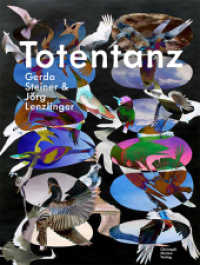- ホーム
- > 洋書
- > 英文書
- > Health / Fitness
Full Description
The Hormone of Closeness offers an exciting physiological perspective on intimacy and relationships. The closeness hormone, oxytocin, give us comfort and peace, but it also creates and reinforces relationships throughout life. Based on current research, Kerstin Uvnäs Moberg, the author of the ground-breaking The Oxytocin Factor, describes the importance of oxytocin in the connection between parents and children, in love and companionship and in increasing trust in our society.
The author argues that oxytocin plays a crucial part in our ability to socialise, feel secure and calm, work well and be healthy. She investigates the effects of oxytocin in pregnancy, childbirth, and breastfeeding, and looks at the role of oxytocin in the mother-child relationship and its long-term benefits.
Oxytocin also has an important role to play in adult relationships. It creates a bond between lovers and stimulates social interaction allowing us to form friendships and work in groups. The sense of trust triggered by oxytocin enables us to trust in strangers and accounts for the Doula phenomenon. The relationship between food and closeness is explored, and we learn how the hormone of closeness can offer the key to good health and a longer life.








